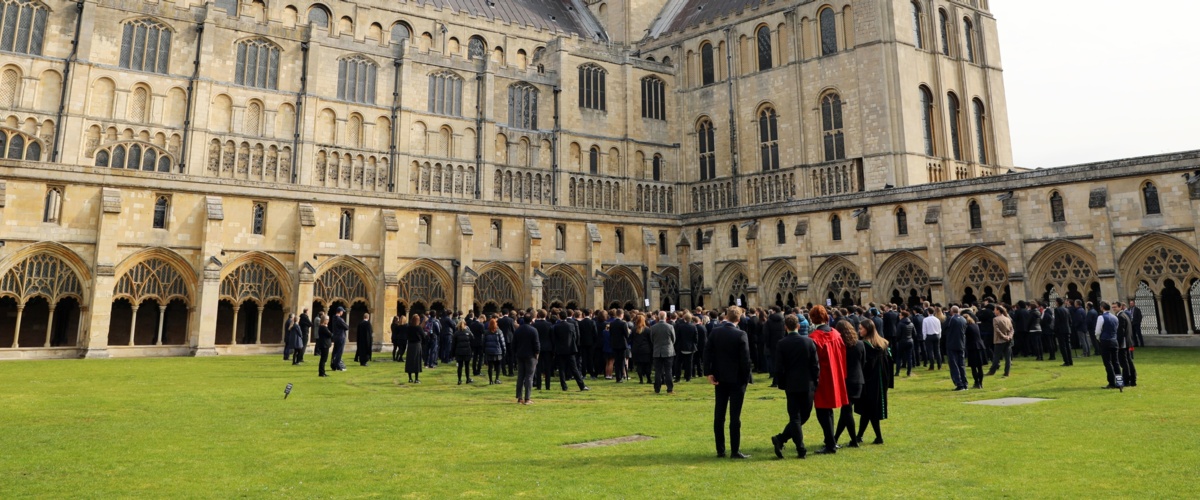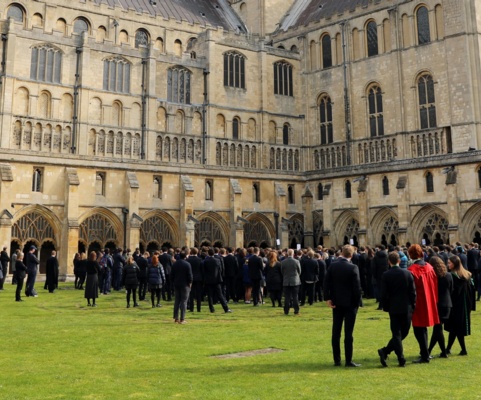Last week we welcomed ON (81-90) Ed Gillespie, keynote speaker, writer and poet, to talk to our school community about the critical issue of climate change and our collective response. He addressed the School in an assembly in the Norwich Cathedral cloisters.
“Good morning, it is an honour and a privilege to speak with you today, in these magnificent cloisters.
It is almost impossible to believe it is 33 years since I left Norwich school. Life is fun. But it is short. The way we use our brief time here matters. Perhaps now more than ever.
It is half a century, a full fifty years since the Club of Rome released their seminal report on the Limits to Growth, predicting the destructive impossibility of infinite economic growth on a finite planet. Predictions which have largely come true.
It is 52 years since the very first Earth Day on April 22nd 1970 which began to give voice to a rising environmental consciousness. This was powered by the iconic imagery of our fragile blue planet seen for the first time from the surface of another celestial body, by the astronauts of the Apollo moon landing in 1968.
And it is 164 years since scientist John Tyndall, after whom the University of East Anglia’s world-famous Tyndall Centre for Climate Change research is named, first demonstrated the global warming effects of water vapour, methane and carbon dioxide in our atmosphere.
We have known what is happening for a very long time. And yet, here we are in the teeth of an ecological crisis, a climate emergency, a moment of reckoning with our turbulent history of resource extraction, human exploitation and environmental destruction. An historic reckoning on which all of our collective futures depends.
When I arrived in this world on 28th June 1972 the level of carbon dioxide in the atmosphere was 327ppm. Today it is 420ppm. A full third higher and the highest concentration in 2 million years. As a result of this insulating blanket of gases around our Earth, the rate of temperature rise in the last half century of my lifetime is the highest in 2,000 years.
We remember the 40-degree heatwave that baked the UK last summer, and the 50 degree heatdome that roasted Pakistan, which was then followed almost immediately by a Biblical flood that inundated a third of the country, displacing tens of millions of people. Floods in Germany, violent hurricanes in the US, supertyphoons in Asia and wildfires from California to the Amazon – all the evidence points in one direction – our task is urgent.
As United Nations Secretary General Antonio Guterres noted in last month’s Intergovernmental Panel on Climate Change Synthesis Report:
“The climate time-bomb is ticking. Our world needs climate action on all fronts – everything, everywhere, all at once”
On Earth Day last Saturday I stood with tens of thousands of fellow Extinction Rebels in Parliament Square to protest the mistruths and woefully inadequate response of our Government to this crisis…and then we all lay down on the ground for a mass ‘die-in’…to represent the unprecedented destruction of species we are inflicting on our home. It was a powerful and poignant moment of eerie calm, the sea of prostrate bodies outside the Palace of Westminster, with only the birdsong from the trees along the river Thames to break the potent silence.
We did this because our crisis is not just about parts per million of carbon in the atmosphere warming the planet. It is also about the damage being wrought to the interconnected, interdependent, inextricably interwoven web of life.
We have lost 60% of all our vertebrate animals on the planet since the 1970s. That’s 60% less of all animals with backbones. In my lifetime alone.
As a child growing up in Norfolk in the seventies when driving at night the insects coming out of the darkness in the car headlights were literally a ‘moth snowstorm’ – for Star Wars fans it was like the Millennium Falcon going into hyperspace. Now at night you see almost nothing. We have lost 75% of our insects in the last 25 years. It is ‘insectageddon’.
This is not the sixth mass extinction event. It’s the first mass extermination event, because we are acutely aware of what we are doing.
As the comedian Ben Elton once noted ‘I resent the creation of a world in which beauty is a painful reminder of what we have lost, rather than what we have still got.’
So, our climate change challenge is not just a quantified transaction between our lives, our economy and the atmosphere. It is a symptom of broken relationships. Our relationship with one another – as those least responsible for historical carbon emissions like Pakistan are already bearing the worst brunt of catastrophic climate impacts. And its about our relationship with the natural world – that we have treated as ‘dumb resources’ to be consumed for our benefit with devastating effect.
It is I think apposite we are gathered here today in the cloisters of this awe-inspiring cathedral.
The word ‘cloister’ comes from the latin ‘claustrum’ which means ‘enclosure’ – a solid and continuous barrier to separate monks, nuns and the ecclesiastical community from the serfs, the workmen and women, the common folk, and in effect the wider world.
It is a tragic irony that we have become ‘cloistered’ – separated from one another and from the nature that truly, manifestly sustains us.
It is this blunt and brutal separation, our reckless cult of individualism and consumerism, and our instrumental, utilitarian use of nature, that has led us to this pivotal, liminal moment in time of grave and urgent danger.
We have I think been ‘wilfully blind’ to these emerging threats precisely because of this sense of disconnection.
This is perhaps best illustrated by the continued exploration and pursuit of yet more fossil fuel supplies, whose combustion is cooking the planet, when we already have five times more fossil fuel resources listed as valuable assets on international stock exchanges than we can actually burn if we intend to stick to the 1.5 degree limit on global climate change that the Paris Agreement dictates.
This is why ‘Just Stop Oil’ campaigners do what they do. Not because they are a mob of crazy ‘eco-zealots’ intent on disruption and vandalism, but because they are calling out the mad contradictions in a system that is both deaf and blind to reason, rationality and reality.
Let’s be clear – we do not need ANY more new fossil fuels, because we simply cannot burn the reserves we already have, the vast majority, 80% of which must stay in the ground. That is the uncomfortable truth.
I should also say that any eco-anxiety or grief we might feel at this point is perfectly normal. We must not ‘cloister’ ourselves from that sense of loss. We grieve precisely because we love.
The hard truth is we’re not going to beat climate change. It’s not a binary, polarised win or lose scenario that will be completed in our lifetimes.
Climate change is, like the building of this cathedral which took 200 years, an inter-generational challenge.
And here in these cloisters if you look up to the vaulted ceilings you will see a source of possible inspiration - the bosses of ‘The Green Man’, a human face surrounded by green leaves.
Although these cloisters are 600 years old, the idea of ‘The Green Man’ is ancient. A pagan symbol of rebirth, of new spring growth and fertility that dates back thousands of years.
Every ethnic indigenous culture on the planet recognises our indivisibility from nature as ours surely once did too. That our fates are intertwined. We need to rediscover our love of nature and reconnect to what truly matters..
Because in the future we will all have to live differently, starting today.
We will eat largely plant-based diets from food grown in the UK.
We will fly much less.
We will use and generate most of our energy from nature’s wild forces of renewables like wind and solar. East Anglia is already a global centre of offshore wind.
We will buy fewer things and be wiser to the origins, the treatment of the places and people who make our stuff and grow our food, and the reuse or recyclability of everything.
But we will also have to change the system in which we live. To be fairer. More democratic through citizen’s assemblies. To share our wealth. To protect the most vulnerable, and the wider family of wildlife that is currently voiceless.
This will require creativity, compassion and critical thinking. Creativity to think and act differently, compassion to embody love, care and concern for all life, and critical thinking to discern truth and fact amongst the noise of misinformation. Embodying these will require both courage and kindness.
To change everything, we need everyone. And the environmental movement is the biggest grassroots movement the world has ever seen.
Our challenge, your challenge, as you prepare to contribute to a world that you were not born into, but as philosopher Alan Watts says were ‘born out of, like a wave from an ocean’ is to become the 21st century green men and women.
Our work together is building a better tomorrow, on cathedral timescales. But that work begins right now.
We must bridge the inter-generational divide by talking to our friends, our teachers, our parents and our grandparents – ask them what they are already doing and are prepared to do to change the world that you and your children will inherit.
As the writer Arundhatti Roy poetically puts it “Another world is not only possible, she is on her way. On a quiet day, I can hear her breathing.”
By the time you are my age in 30 or 40 years time, we will all know if that world has been born.
So, in the week of Earth Day 2023 please do NOT ‘keep calm and carry on’, get excited and change things.
Thank you for listening.”


